- Tours & Experiences
- Tailor-made Trips
- Bahasa Indonesia

Create a Japan Travel account
Email reset password link.
- Travel Alerts
Coronavirus in Japan: Travel Updates
Last updated: Oct 15th 2022
Follow our latest updates on the coronavirus (Covid-19) situation in Japan.
Since October 11th 2022 , Japan has fully reopened its borders to tourists, allowing visa-free, independent travel to Japan once again 🙌
- A visa is no longer required for short stays (up to 90 days).
- It's not necessary to book through a travel agency.
- Daily entry caps have been phased out entirely.
Table of contents
- Travel updates
- Staying safe in Japan: Covid FAQ
- Travel Advisories
- Official resources
As borders re-open, we'll no longer be updating this page regularly. Always check official venue websites for their latest updates.
Travel Updates
- Share on Facebook
- Share on Twitter
- Copy link to share
Borders set to Reopen to Independent Travel
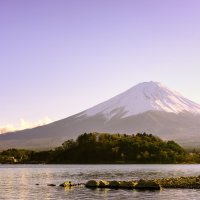
Japan will allow visa-free, independent tourism and abolish daily arrival caps from Oct 11th, announces Prime Minister Kishida. Via Japan Times
Borders open for Tour Groups
Japan's cautious reopening to overseas tourists coincides with strict infection-prevention measures and rules for those hoping to visit Japan. Via Nippon
Temporarily Closed Places in Japan: A-Z Directory
- Share on X (Twitter)

Mazda Museum
The Mazda Museum is currently closed. Tour reservations are also temporarily unavailable. Further updates will be posted to the Mazda Museum official..
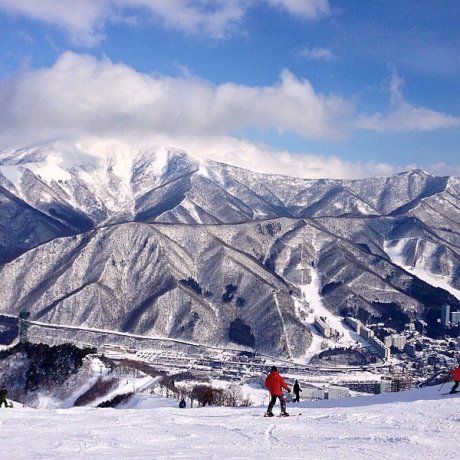
Naeba Ski Resort

Robot Restaurant
Temporarily closed until further notice due to coronavirus measures
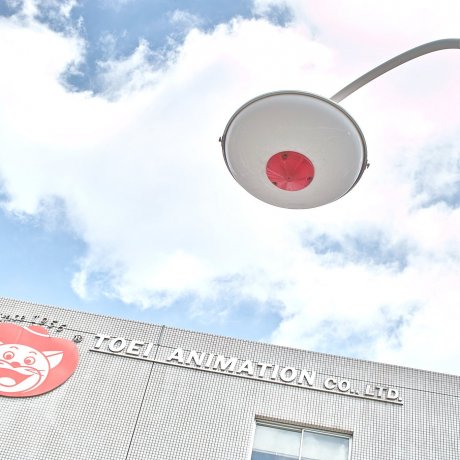
Toei Animation Museum
Cancelled events, covid in japan faq, what precautions work best against coronavirus.
The World Health Organization's advice is as follows:
- Wash your hands regularly – with soap and warm water, or alcohol-based hand sanitizers (at least 60% alcohol)
- Maintain social distancing – avoid those who are coughing or sneezing (at least 1m). Some countries are implementing lockdowns and recommending keeping 2m from strangers.
- Avoid touching eyes, nose and mouth – potential points of entry for coronavirus particles
- Practice respiratory hygiene – covering your mouth when you cough, and disposing of tissues promptly followed by washing hands.
- Wear a mask – wearing a face covering can help prevent the spread of infection. See their dedicated guidance here on face masks .
Should I wear a mask?
Summary : The WHO recommends wearing face masks as of June 2020.
If you are travelling in Japan, wearing a face mask in certain contexts (e.g. riding public transport, crowded areas) can be an effective measure as part of a wider strategy against infection/transmission, as per WHO guidelines .
Do I need travel insurance?
Whether you are already in Japan, preparing for a trip, or are planning ahead, we recommend taking out comprehensive travel insurance. This is both to insure against the prospect of unforeseen medical expenses if the need arise, but also against changing travel plans as the situation develops.
Note that it is essential to check your home country travel advice if you plan to travel to Japan. This is to ensure there is no impact on your insurance coverage.
What should I do if concerned by coronavirus in Japan?
Contact JNTO's Visitor Hotline. Japan National Tourism Organization (JNTO) operate a 24/7 visitor hotline service, available in English, Chinese, Korean and Japanese. It can be called for assistance in case of accidents or emergencies relating to the coronavirus:
- From Japan 050-3816-2787
- From Overseas +81-50-3816-2787
What should I do if I feel sick?
If you are feeling unwell, please consult the following:
- List of medical institutions with foreign-language services (English),
- The JNTO Hotline: 050-3816-2787
Can tourists enter Japan?
As of Oct 11th 2022, visitors can now enter Japan visa-free for short-term stays (up to 90 days).
Official Japan travel advisories
Please consult these official advisories from countries overseas to gauge the current advice on travelling overseas at this time.
Official resources
Let us know how we can help.
- Subscribe Digital Print

- NOTO PENINSULA FLOODING
- Special series: Boiling Point
Latest News
Today's print edition
Home Delivery
- Crime & Legal
- Science & Health
- More sports
- CLIMATE CHANGE
- SUSTAINABILITY
- EARTH SCIENCE
- Food & Drink
- Style & Design
- TV & Streaming
- Entertainment news
Japan to ease tourism restrictions and raise daily arrival cap to 50,000
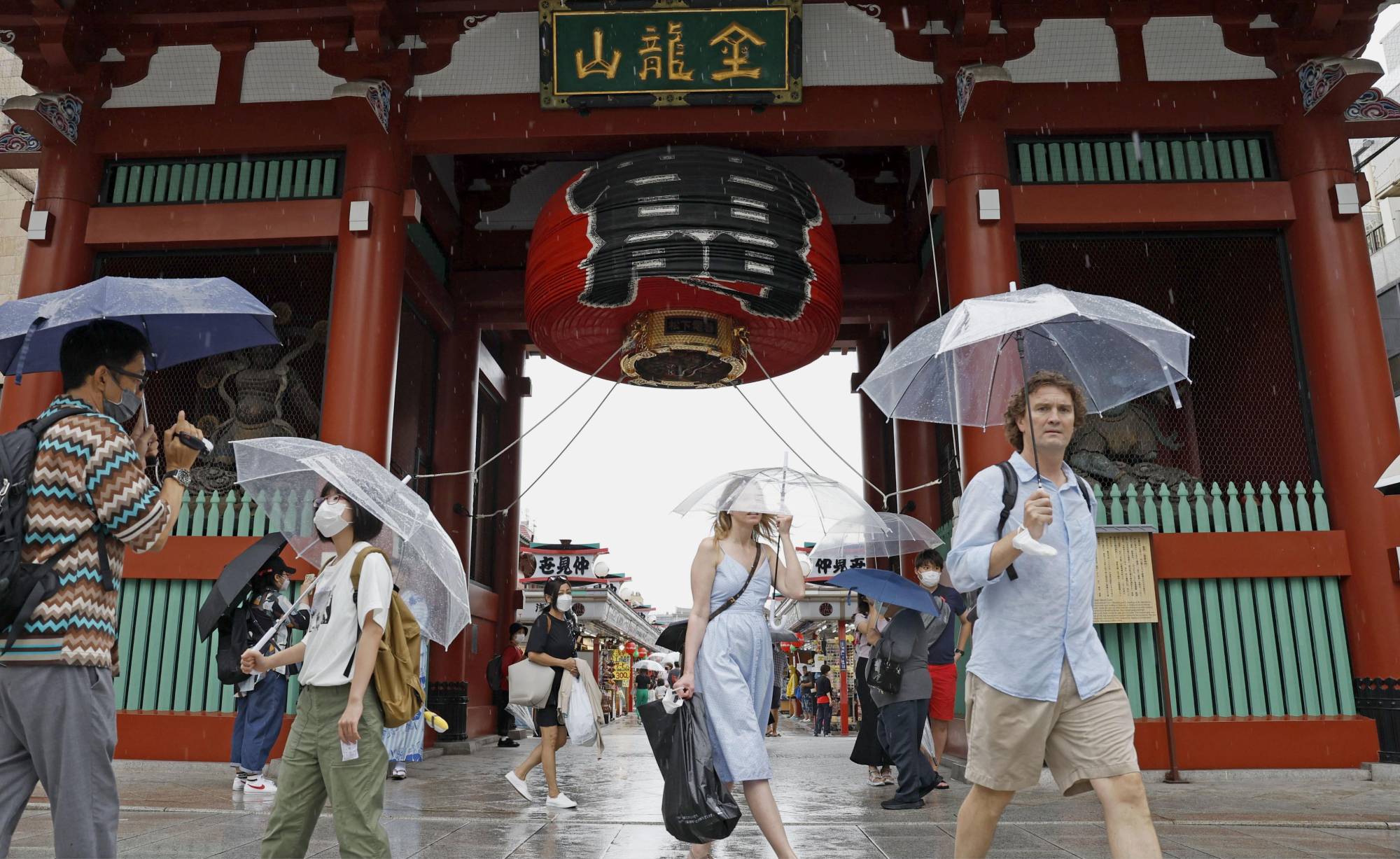
Prime Minister Fumio Kishida said Wednesday that Japan will allow the entry of nonescorted visitors on package tours and raise the daily arrival cap to 50,000 starting Sept. 7 — a significant step toward the full resumption of tourism.
The prime minister also said he will consider easing restrictions further based on various conditions at home and abroad, aiming to put border measures on par with fellow members of the Group of Seven major countries.
Japan has been allowing foreign tourists into the country since June, but only on guided tours .
The government has not yet come up with details of what constitutes a package tour, but guidelines will be released in the coming days, a government official said.
But a tourism ministry official said that tourists will still need to have “sponsors,” or travel agencies in Japan that they can contact if they get infected with the coronavirus, meaning individual tourists, such as backpackers traveling without a sponsor, won’t be allowed in.
Still, the latest announcement will be welcome news for the country’s battered tourism industry , as the strict, guided tours have proven to be unpopular with foreign tourists .
In the two months through the end of July, only 8,155 foreign tourists visited Japan, according to the Immigration Services Agency.
In July, an online survey conducted by D2C X, a tourism marketing firm, showed that 72% of about 1,700 respondents said they would — or were likely to — give up visiting Japan if the current border controls remained in place.
Currently, foreign tourists need to reserve a guided tour and then apply for a visa — a time-consuming process that discourages visitors from coming to Japan.
Last week, Kishida said Japan will drop pre-arrival PCR tests from Sept. 7 if passengers have received three shots of an approved vaccine.
The daily arrival cap — the number of people able to enter Japan each day, including Japanese nationals and foreign residents — will be raised to 50,000, or 2.5 times the current figure of 20,000.
The number has been raised in stages over the past six months or so. In February, the figure was 3,500, but it was raised to 10,000 in April and then to 20,000 in June.
Om Prakash, president of the American Chamber of Commerce in Japan (ACCJ), welcomed the latest easing of border restrictions.
"The ACCJ believes these are important steps toward reviving the economy,” Prakash said in an email. “We highly encourage Japan to align travel policies with other G7 countries, and in order to restore Japan’s reputation as a welcoming and open place, the government should move quickly to restore visa waiver eligibility for business travelers and tourists from countries of origin previously eligible for visa-free entry."
Timeline of Japan’s COVID-19 border restrictions
Jan. 31, 2020: Japan bans the entry of foreign nationals arriving from China’s Hubei Province, the first entry ban imposed due to the coronavirus. The ban was gradually expanded to 24 countries through the end of March.
April 1: Less than a month after the spread of COVID-19 was declared a pandemic, Japan halts entries into the country by foreign nationals, including foreign residents of Japan, from 49 countries, including the U.S., the U.K. and South Korea, bringing the total number up to 73 nations.
May 14: Japan expands its entry ban to cover a total of 100 countries and regions.
Aug. 28: The entry ban is expanded further to cover 159 countries and regions.
Sept. 1: Japan lifts ban on re-entry of foreign residents.
Oct. 1: Japan lifts its ban on entry by foreign nationals planning to relocate to the country.
Dec. 28: Japan again implements a ban on the entry of nonresident foreign nationals.
Jan. 14, 2021: Japan suspends a business-track travel program with some countries and mandates that all people arriving in the country quarantine at home for 14 days.
Nov. 8: Japan opens its borders to foreign students, interns and other business travelers.
Nov. 30: Japan bans the entry of nonresident foreign nationals after the discovery of the highly contagious omicron variant.
March 1, 2022: Japan allows foreign nationals arriving for purposes other than tourism to enter the country.
June 1: Japan raises daily arrival cap to 20,000.
June 10: Japan allows entry of foreign tourists on guided tours.
Sept. 7: Pre-arrival PCR tests to be dropped for travelers who have received three shots of an approved COVID-19 vaccine. Japan will also raise the daily arrival cap to 50,000 and allow entry of foreign tourists on nonguided tours.

In a time of both misinformation and too much information, quality journalism is more crucial than ever. By subscribing, you can help us get the story right.
With your current subscription plan you can comment on stories. However, before writing your first comment, please create a display name in the Profile section of your subscriber account page.
Your subscription plan doesn't allow commenting. To learn more see our FAQ
- WHAT’S TRENDING
- Editors' Picks

SUSTAINABLE JAPAN

SPECIAL SUPPLEMENTS
Sponsored contents planned and edited by JT Media Enterprise Division.
広告出稿に関するおといあわせはこちらまで
SUPPLEMENTS BINDER

- Bridges by SMS
- Global Insight
- World Eye Reports
Japan to relax Covid travel restrictions and grant entry to independent tourists
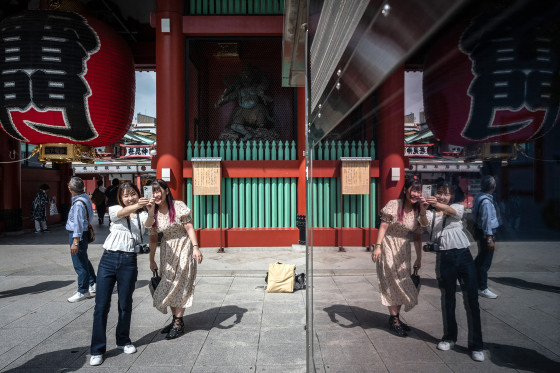
NEW YORK — Japan’s strict border restrictions will be loosened next month, the prime minister announced Thursday, allowing tourists to easily enter for the first time since the start of the pandemic.
In a news conference at the foot of Central Park in New York, Prime Minister Fumio Kishida said independent tourists would again be welcomed as of Oct. 11, not just those traveling with authorized groups.
A cap on the number of tourists who are granted entry — which has been gradually increased this year — will be nixed altogether. And visa requirements that were imposed in response to the pandemic will also be rescinded.
Japan’s tough Covid-19 restrictions have sent the number of visitors plummeting and its tourism industry reeling. Though foreign tourists were welcomed back in June after a pause of more than two years, the reopening has been confusing to many seeking to visit.
A previous announcement billed as an easing of the group tour rule turned out, for many tourists, to be anything but — introducing a convoluted process requiring obtaining clearance via a Japanese travel agent, often with hefty fees or commissions attached.
Now, the country appears to be returning to normal, in time for some to book travel for Japan’s fall foliage. Kishida said a campaign aimed at bolstering the tourism industry would be rolled out offering discounts.
“We hope that many citizens will take advantage,” he said as he wrapped up a trip to New York.
Until now, Japan persisted in pandemic travel rules that many other countries have long since dropped. Some tourists have shifted vacations to countries including South Korea and Thailand, which have had looser rules of late.
Kishida spoke on the sidelines of the U.N. General Assembly. In other remarks, he called for reform of the U.N. Security Council and dismissed any skepticism about Japan’s increased military spending, saying it remained a “peace-loving nation.”
He also said Japan would “boldly take necessary steps” to combat excessive fluctuation of the yen, which has dropped to its lowest level against the U.S. dollar in more than two decades.
Inside Kyoto
A Kyoto Travel Guide
Can I Travel To Japan Now? September 2024
Japan is finally open! Travelers from most countries can now enter Japan without applying for a visa in advance. Best of all, there are NO Covid protocols to enter Japan: You do NOT need proof of vaccination or a negative test to enter Japan.

Situation Summary
Last Update: December 4, 2023 (this page will be updated as needed)
- Japan is open! Visa-free, independent travel is now possible for most nationalities.
- There are NO Covid protocols for Japan. You do NOT need to be vaccinated against Covid to enter Japan. You do NOT need a negative Covid test to enter Japan.
- You can use the Visit Japan Web app to upload your immigration and customs details in advance. See our Guide to the Visit Japan Web app and Japan Entry Procedures for all the details. Note that the app is strongly recommended but not mandatory for entry to Japan. In fact, it’s probably quicker to not use the Visit Japan app on arrival.
- On March 13 2023, the indoor masking recommendation was dropped in Japan. You do not have to wear a mask in stores, restaurants, attractions, and on public transport. Some shops and restaurants may still ask that you mask, however. See our Japan mask page for details.
- Now is the time to start planning a trip to Japan. Contact Chris Rowthorn to start planning .
Commentary by Chris
Visa-free, independent travel restarted on October 11 2023. Citizens of 68 countries now get visa-free travel to Japan. Here’s the Japan Ministry of Foreign Affairs visa-free travel list . If you are a citizen of one of those countries, you do not need to apply for a visa in advance; you will be given a 90-day tourist visa upon arrival in Japan (note that there are few exceptions which are listed on the MOFA site).
Given that Japan is now open, it’s time to start planning a trip. If you want help planning a trip to Japan, visit my consulting page to book a Zoom consultation.
What You Need to Do Now
If you’re planning a trip to Japan, there are some things you should do now. There is a lot of pent up demand for travel to Japan, so plane tickets and accommodations should be a priority.
- Buy plane tickets: compare flight prices and times for the best deals.
- Book hotels and ryokans: check Booking.com and Agoda.com .
- View our Packing List for Japan to make sure you don’t forget to bring anything.
Consider Doing
- Book some walking tours .
- Travel insurance: World Nomads offers simple and flexible travel insurance. Buy at home or while traveling and claim online from anywhere in the world.
- Buy a Japan Rail Pass : Order one here .
- Buy a Icoca card : Get one here .
- Buy a SIM or pocket wifi : Order one here .
Check Hotel Availability
Destination, check-in date, check-out date.

Do You Need to Be Vaccinated to Enter Japan?
You do NOT need to be vaccinated with a Covid vaccine to enter Japan.
Do You Need a Covid Test to Enter Japan?
You do NOT need a negative Covid test to enter Japan.
Flights to Japan Currently Operating
Flights to Japan have mostly returned to pre-pandemic schedules and availability: compare flight prices and times for the best deals.

More Useful Information
- Best Hotels in Kyoto
- Best Hotels in Tokyo
- Japan Rail Pass Guide
Kyoto Vacation Checklist
- For all the essentials in a brief overview, see my First Time In Kyoto guide
- Check Kyoto accommodation availability on Booking.com and Agoda.com - often you can book with no upfront payment and free cancellation
- You can buy shinkansen (bullet train) tickets online from Klook - popular routes include Tokyo to Kyoto , Kyoto to Osaka and Kyoto to Tokyo
- Need tips on where to stay? See my one page guide Where To Stay In Kyoto
- See my comprehensive Packing List For Japan
- You can buy an eSim to activate in Japan or buy a data-only SIM card online for collection when you arrive at Tokyo's Narita or Haneda Airports or Kansai International Airport . You can also rent an unlimited data pocket wifi router
- Compare Japan flight prices and timings to find the best deals
- If you're making frequent train journeys during your visit, you might save money with Japan Rail Pass – see if it's worth it for you
- A prepaid Welcome Suica card makes travelling around Kyoto easy – here's how
- World Nomads offers simple and flexible travel insurance. Buy at home or while traveling and claim online from anywhere in the world
- Do you want help planning your trip? Chris Rowthorn and his team of Japan experts at Japan Travel Consulting can help
Kyoto District Map

- Central Kyoto
- Northwest Kyoto
- Northern Higashiyama
- Southern Higashiyama
- Downtown Kyoto
- Kyoto Station Area
- South East Kyoto
Disclosure: InsideKyoto.com is a participant in the Amazon Services LLC Associates Program, an affiliate advertising program designed to provide a means for sites to earn advertising fees by advertising and linking to amazon.com and amazon.co.uk. World Nomads provides travel insurance for travellers in over 100 countries. As an affiliate, we receive a fee when you get a quote from World Nomads using this link. We do not represent World Nomads. This is information only and not a recommendation to buy travel insurance.
This is how you can visit Japan as travel rules ease for fall

Sep 12, 2022 • 4 min read

Japan has relaxed its entry rules again © Getty Images
Travel to Japan has been heavily restricted since borders snapped shut two-and-a-half years ago. Up until now, it hasn't been easy for tourists to get there, with only organized group tours allowed into the country for much of 2022. But last week, the government announced that things are changing, and self-guided trips are back.
By self-guided trips, we mean that travelers no longer need to be accompanied by a guide during their trip. But unrestricted tourism is still off the cards. In order to visit Japan, travelers must book their flights and accommodation through a licensed travel agency.
There are reports, however, that Japan could remove the daily cap of 50,000 arrivals by the end of the month and return to visa-free and independent travel. Japan's chief cabinet secretary, Hirokazu Matsuno, said the government is considering ways to ease the current pandemic restrictions while "maintaining a balance between preventing the spread of infection and promoting social and economic activities".
In the meantime, if you've long dreamed of visiting the neon-bright neighborhoods of Tokyo or the once-in-a-lifetime attractions of Kyoto , and you're keen to do it as soon as possible, here's what you need to know about entry and visa rules for visiting Japan as a tourist.
The 10 most spectacular road trips in Japan
Japan's new entry rules
In June, tourists were allowed to return to Japan but as part of an organized group tour whereby they have to be accompanied by a local guide for the duration of their trip. But that rule was scrapped on September 7 in favor of a more relaxed policy that allows self-guided trips.
That said, you can't rock up after booking a flight online. You must book your flight and accommodation through a registered travel agency, so the government has a point of contact for you. That means the only route in is via package vacations, for now, guided or self-guided - whatever your preference.
You must wear masks and adhere to other COVID-19 measures. You'll also need to present a negative COVID-19 test taken within 72 hours of their departure date if you haven't been triple vaccinated and you must install the MySOS app , where you can register your test results.
Before the pandemic, Japan offered visa-free entry to visitors from some 68 countries,s including the United States, United Kingdom, Australia, South Korea, and Malaysia, but for now, "everyone needs a visa," according to the Foreign Ministry, regardless of where they are coming from.
Discover Japan's 10 most spectacular natural wonders

How tourists can apply for a visa to visit Japan
The visa exemption scheme for Japan remains on hold for now, which means that anyone who wishes to visit must apply for and obtain a tourist visa first. You can apply for a certificate for registration to ERFS (Entrants, Returnees Follow-up System) through the travel agency you've booked their trip with. Once that's processed, you'll receive a document you can take to your local Japanese embassy or consulate to obtain a visa or apply for the visa directly with the tourism agency. The turnaround time is generally five working days after the documents are received and accepted.
US and Canadian citizens can apply for an eVisa
A new eVisa scheme was introduced last month for US and Canadian citizens. The eVisa is available for tourist and business travelers and those visiting relatives. Applicants must hold a valid US or Canadian passport.
Before applying for the eVisa, applicants must obtain a certificate for registration to the ERFS through the travel agency they've booked their trip with. According to the Japanese embassy, those visiting relatives don't need to apply for an ERFS, but they must instead download marriage certificates or proof of kinship.
If you're looking to apply, you must have these forms in order, and then complete the eVisa form online through the Ministry of Foreign Affairs. You'll need passport information, travel documents, and supporting documents like ERFS to hand. A processing fee will also apply. Once the application is completed and approved, the eVisa will be issued by email.
Japan's best food and drink experiences
Japan's COVID-19 vaccination requirements
Japan categorizes countries into blue, yellow, or red based on their COVID risk. Travelers from blue countries have the option to show proof of vaccination or take a test before traveling. Blue countries include the US, the UK, Australia, New Zealand, Canada, France, Ireland, Italy, Thailand, Singapore, Hong Kong, Argentina, Mexico, and more. The complete list of countries can be viewed here .
Travelers from yellow and red countries are subject to additional entry requirements, such as testing upon arrival and quarantine.
This article was first published Oct 13, 2020 and updated Sep 12, 2022.
Explore related stories

Destination Practicalities
Mar 28, 2023 • 3 min read
Here’s all you need to know about getting a traveler visa to visit China now that “zero COVID” has come and gone.

Nov 30, 2021 • 6 min read

Sep 1, 2021 • 1 min read

Sep 22, 2024 • 6 min read
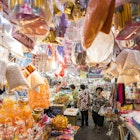
Sep 16, 2024 • 10 min read

Aug 23, 2024 • 7 min read

Aug 8, 2024 • 13 min read

Aug 5, 2024 • 6 min read

Jul 12, 2024 • 6 min read
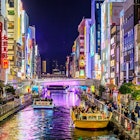
Jun 12, 2024 • 8 min read

Covid-19 Travel
Japan will fully reopen to travellers in October — here's what you need to know
According to prime minister fumio kishida, individual tourists can soon visit without tough restrictions.

September 24, 2022
- Share on Facebook
- Share on LinkedIn
- Share on WhatsApp
- Travel Advisories |
- Contact Us |
- MyTravelGov |
Find U.S. Embassies & Consulates
Travel.state.gov, congressional liaison, special issuance agency, u.s. passports, international travel, intercountry adoption, international parental child abduction, records and authentications, popular links, travel advisories, mytravelgov, stay connected, legal resources, legal information, info for u.s. law enforcement, replace or certify documents.
Share this page:
Japan Travel Advisory
Travel advisory january 8, 2024, japan - level 1: exercise normal precautions.
Japan – Level 1: Exercise Normal Precautions
Reissued after periodic review without changes.
Exercise normal precautions in Japan.
Read the country information page for additional information on travel to Japan.
If you decide to travel to Japan:
- Enroll in the Smart Traveler Enrollment Program (STEP) to receive Alerts and make it easier to locate you in an emergency.
- Follow the Department of State on Facebook and Twitter .
- Follow Embassy Tokyo’s American Citizen Services section on Facebook and Twitter .
- Review the Country Security Report for Japan.
- Visit the CDC page for the latest Travel Health Information related to your travel.
- Prepare a contingency plan for emergency situations. Review the Traveler’s Checklist .
Travel Advisory Levels
Assistance for u.s. citizens, search for travel advisories, external link.
You are about to leave travel.state.gov for an external website that is not maintained by the U.S. Department of State.
Links to external websites are provided as a convenience and should not be construed as an endorsement by the U.S. Department of State of the views or products contained therein. If you wish to remain on travel.state.gov, click the "cancel" message.
You are about to visit:
We’re sorry, this site is currently experiencing technical difficulties. Please try again in a few moments. Exception: request blocked
Japan Travel Restrictions
Traveler's COVID-19 vaccination status
Traveling from the United States to Japan
Open for vaccinated visitors
COVID-19 testing
Not required
Not required for vaccinated visitors
Restaurants
Recommended in public spaces.
Japan entry details and exceptions
Documents & additional resources, ready to travel, find flights to japan, find stays in japan, explore more countries on travel restrictions map, destinations you can travel to now, dominican republic, netherlands, philippines, puerto rico, switzerland, united arab emirates, united kingdom, know when to go.
Sign up for email alerts as countries begin to open - choose the destinations you're interested in so you're in the know.
Can I travel to Japan from the United States?
Most visitors from the United States, regardless of vaccination status, can enter Japan.
Can I travel to Japan if I am vaccinated?
Fully vaccinated visitors from the United States can enter Japan without restrictions.
Can I travel to Japan without being vaccinated?
Unvaccinated visitors from the United States can enter Japan without restrictions.
Do I need a COVID test to enter Japan?
Visitors from the United States are not required to present a negative COVID-19 PCR test or antigen result upon entering Japan.
Can I travel to Japan without quarantine?
Travelers from the United States are not required to quarantine.
Do I need to wear a mask in Japan?
Mask usage in Japan is recommended in public spaces.
Are the restaurants and bars open in Japan?
Restaurants in Japan are open. Bars in Japan are .
Japan reopening details: What you need to know now

On Sept. 26, Japan's Ministry of Foreign Affairs, which governs entry requirements, officially announced that as of midnight local time on Oct. 11, "foreign nationals enter[ing] into Japan for a short-term stay for tourism will be no longer limited under package tours." On the same date, according to the website, a visa will no longer be required for visitors from 68 countries, including the United States, Canada and the United Kingdom.
Current Japan visa requirements and tour restrictions will remain in place until Oct. 11.
Japan is one of the last remaining nations with strict COVID-19-related bans and restrictions on general tourism.
While supervised group tours to Japan have been available for the past few months, the restrictions on travel discouraged many people from booking trips. If the plan to reopen more fully moves forward, Japan will welcome back individual tourists and resume visa waivers, among other changes.
Travelers should be mindful that the Japanese government has not yet supplied complete details for the reopening, including COVID-19-related entry requirements. Given prior announcements of plans to reopen for tourism that proved quite limited, TPG recommends travelers await full details from the Japanese Consulate before booking a trip.
Read on to find out the available details of the announcement and what it might mean in terms of planning your long-awaited trip to Japan.
Japan reopening details
In his Sept. 22 press conference in New York, Prime Minister Fumio Kishida said individual tourists will soon be welcomed to Japan without the requirement of visas or group tours, as reported by the Japan Times .
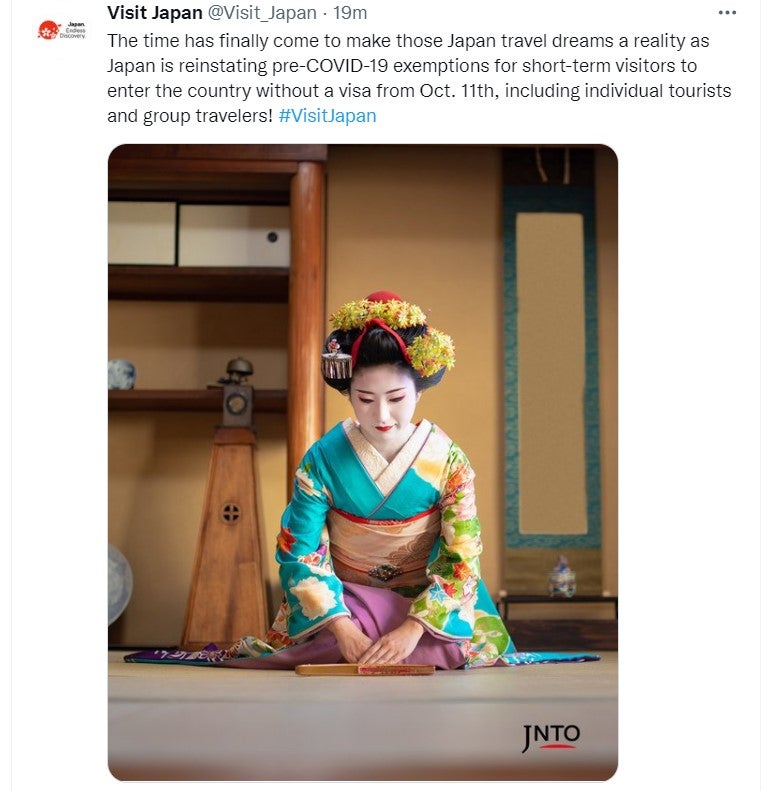
Following the Prime Minister's announcement of reopening, the visa website for the Embassy of Japan and the Ministry of Foreign Affairs website have each added brief notes confirming the Oct. 11 reopening plan.
U.S. travelers planning a trip should consult these websites for the latest information prior to making any travel arrangements.
According to these government websites, Japanese entry requirements will return to pre-COVID-19 policies, with tourists from the U.S. and 67 other countries permitted to visit Japan for up to 90 days without a visa.
However, travelers still must provide proof of vaccination (including a booster shot) or a negative COVID-19 PCR test to enter the country without quarantine, according to the Embassy of Japan's website. Visitors will still be "required to upload either a pre-departure COVID-19 testing result or a valid vaccine certificate through Fast Track/My SOS ."
Consult the Japanese Ministry of Health, Labour and Welfare visitor webpage for the latest COVID-19-related entry requirements.
The cap on daily visitors to Japan, which had recently risen from 20,000 to 50,000, will also be lifted as of Oct. 11 to allow an unrestricted number of foreign entries, according to the latest information from the Ministry of Foreign Affairs.
And while the Japanese government has not mandated mask-wearing, expect it to still be strongly encouraged and privately enforced at hotels and shops around the country. "About 98% of Japanese are still wearing masks," Kenny Onishi, general manager for tour operator Intrepid Travel in Japan told TPG in an interview. Mask-wearing "may be required to enter some stores and restaurants, and some may check your temperature," according to Onishi.
Related: Japan reopens for tour groups
How to plan a Japan trip now
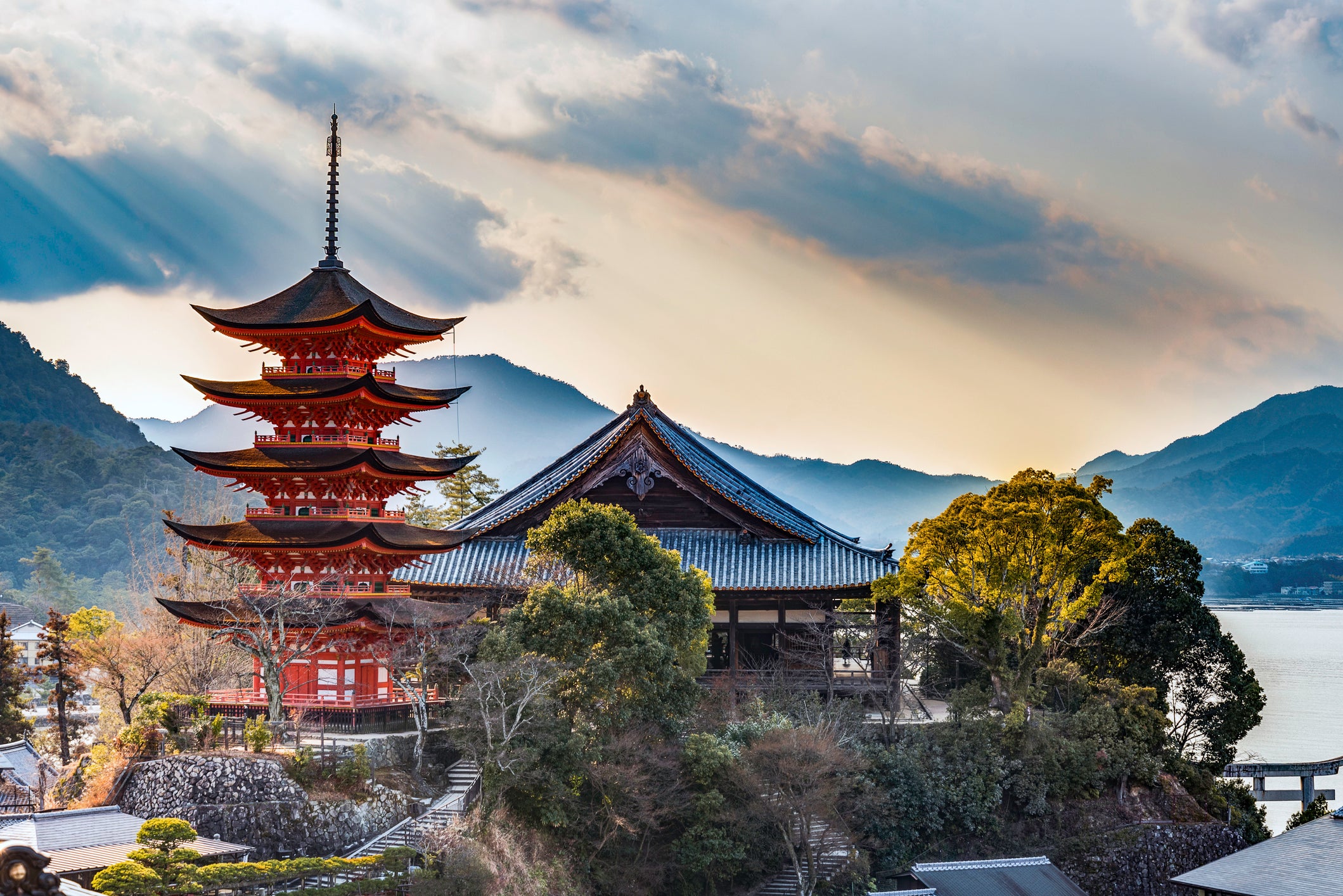
Assuming unrestricted visa-free tourism returns to Japan in October as scheduled, expect there to be a huge uptick in flight, lodging and tour reservations.
"We're absolutely delighted to hear this," Julie McCormack, program director for Asia for the MT Sobek tour operator, told TPG on a call to discuss Kishida's announcement. "We've been hoping for this for a long time. Japan had been such a good destination for us before [COVID-19]."
Even though signing up for a group tour may no longer be required for entry to Japan, many visitors typically combine a group tour with a few days on either end of the visit for individual travel. Plus, Japan's eased travel restrictions will mean that tours will have increased access to people, places and activities that might have been curtailed during the pandemic.
So, if you're interested in having a guide for at least part of your trip, try to confirm those plans as soon as possible.
Tour operator Intrepid Travel is hustling to meet pent-up demand in Japan with a flurry of additional trip offerings. It currently has tour groups on the ground there now. These trips have regular schedules allowing guests free time to explore independently as they were able to do before the pandemic, according to Intrepid's Onishi. The company already has 241 Japan tour departures planned for 2023, exceeding its total of 230 Japan trips completed in 2019.
With a crowded market for tour companies, expect some to offer enticing "return to Japan" deals to help relaunch tours. But be aware many people who have had tours canceled in the past due to visa restrictions will have priority for obtaining tour space with some operators during prime periods, like next spring's cherry blossom season.
A strong dollar versus the yen will also make travel within Japan more affordable for Americans. The recent exchange rate of 142 yen to $1 set a 24-year low for the currency.
Kishida also announced the launch of a travel discount program within Japan to help promote tourism, but these benefits will only be available for residents of Japan, according to a Kyodo News report .
Consult the Japan National Tourism Organization website for the latest details on any potential discount programs and other details for foreign tourists.
Related: Using points and miles for a trip to Japan
Bottom line
If Japan does finally reopen to tourists without strict group travel or visa requirements, expect to see a surge of demand for travel to the country. Book as soon as possible, and keep your eyes open for attractive package deals from tour operators eager to rebuild their businesses.
But, given prior false alarms on Japan's reopening, be sure to confirm the latest visa details with the Japanese Embassy or Consulate websites prior to making any nonrefundable reservations.
Travel Alerts and Disaster Updates
2024 noto peninsula earthquake.
In the afternoon of January 1, 2024, a strong earthquake caused widespread damage and the loss of many lives on the Noto Peninsula and surroundings.
The northern part of the Noto Peninsula was most affected. Particularly badly hit were the city of Suzu and the city of Wajima , where the earthquake did not only topple many buildings, but also caused a large fire, which destroyed a considerable part of the city center, including the site of the famous local morning market.
The intensity of the earthquake in the nearby cities of Kanazawa , Takaoka , Toyama and Niigata was also strong, but it caused no widespread damage.
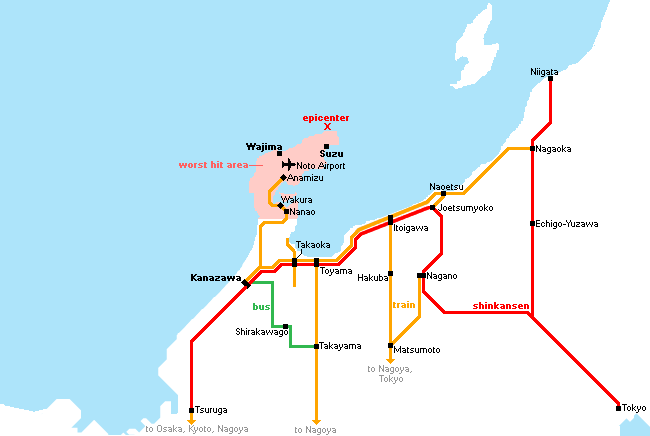
Transportation
Service along many train lines in the region resumed within a couple of days of the earthquake, except on the peninsula itself, where the disruptions lasted longer. The last affected railway, the Noto Railway, resumed service along its entire length on April 6.
It will take several months for the Noto Peninsula to open to tourism again, especially the northern part. But also in Wakura Onsen further down the peninsula, almost all lodgings remain closed until further notice.
Outside the Noto Peninsula, tourism is much less affected. In Kanazawa , most tourist attractions reopened within four days of the quake. An exception was the 21st Century Museum of Contemporary Art , which suffered some damage, but reopened partially on February 6 and fully on June 22. Read our report from Kanazawa from early February .
Coronavirus Outbreak
Japan dropped all remaining COVID-related entry requirements (including the need of COVID testing/vaccination certificates) on April 29, 2023. With this, over three years of COVID-related border measures have came to an end.
Volcano Closures
No-entry zones are currently maintained at the following prominent volcanoes :
- Sakurajima (Level 3 - do not approach the volcano) Do not climb the mountain. Does not affect transportation and tourism.
- Shinmoedake (Kirishima) (Level 1 - potential for increased activity) Closure of hiking trails.
- Kusatsu-Shirane (Level 1 - potential for increased activity) Closure of hiking trails.

- Media & Industry
- Meetings & Events
- Select Language 简体中文 繁體中文(香港) 繁體中文(臺灣) India (English) Bahasa Indonesia 한국어 ภาษาไทย Tiếng Việt Singapore (English) Philippines (English) Malaysia (English) Australia/New Zealand (English) Français Deutsch Italiano Español United Kingdom (English) Nordic countries(English) Canada (English) Canada (Français) United States (English) Mexico (español) Português العربية Japan(日本語) Global (English)
- India (English)
- Bahasa Indonesia
- Singapore (English)
- Philippines (English)
- Malaysia (English)
- Australia/New Zealand (English)
- United Kingdom (English)
- Nordic countries(English)
- Canada (English)
- Canada (Français)
- United States (English)
- Mexico (español)
- Global (English)
- Fujiyoshida
- Shimonoseki
- Ishigaki Island
- Miyako Island
- Kerama Island
- Tokyo Island
- Koka & Shigaraki
- Hida Takayama
- Ginza, Nihonbashi
- Beppu & Yufuin (Onsen)
- Ginzan Onsen
- Nagasaki Islands

- Kumano Kodo
- Shikoku Karst
- Amami Oshima
- Hachimantai
- Omihachiman
- Aizuwakamatsu

- Diving in Japan
- Skiing in Japan
- Seasonal Flowers in Japan
- Sustainable Outdoors
- Off the Beaten Track in Japan
- Scenic Spots
- World Heritage
- Home Stays & Farm Stays

- Japanese Gardens
- Japanese Crafts
- Temple Stays
- Heritage Stays
- Festivals and Events
- Theater in Japan
- Japanese Tea Ceremony
- Cultural Experiences in Japan
- Culture in Japan

- Local Cuisine Eastern Japan
- Local Cuisine Western Japan
- Local Street Food
- Japan's Local Ekiben
- Japanese Whisky
- Vegetarian and Vegan Guide
- Sushi in Japan Guide
- Japanese Sake Breweries

- Art Museums
- Architecture
- Performing Arts
- Art Festivals
- Japanese Anime and Comics
- Japanese Ceramics
- Local Crafts

- Scenic Night Views
- Natural Wonders
- Theme Parks
- Samurai & Ninja
- Iconic Architecture

- Wellness Travel in Japan
- Japanese Ryokan Guide
- A Guide to Stargazing in Japan
- Relaxation in Japan
- Forest Bathing (Shinrin-yoku)

Experiences in Japan
- Enjoy my Japan
- National Parks
Japan's Local Treasures
- Japan Heritage
- Snow Like No Other
- Wonder Around Japan

Visa Information
- Getting to Japan
Airport Access
- COVID-19: Practical Information for Traveling to Japan
- Anime Tourism
- Countryside Stays
- Accessible Tourism
- Hokkaido Great Outdoors
- Scenic World Heritage in Tohoku
- Shikoku’s Nature and Traditions
- Southern Kyushu by Rail

- Traveling by Rail
- How to Travel by Train and Bus
- JR Rail Passes
- Scenic Railways
- Renting a Car
- Sustainable Travel in Japan
- Travel Brochures
- Useful Apps
- Online Reservation Sites
- Eco-friendly Accommodation
- Luxury Accommodations
- Traveling With a Disability
- Hands-free Travel
- How to Book a Certified Tour Guide
- Volunteer Guides
- Tourist Information Center

- Japanese Manners
- Spring in Japan
- Summer in Japan
- Autumn in Japan
- Winter in Japan
- Cherry Blossom Forecast
- Autumn Leaves Forecast

- Japan Visitor Hotline
- Travel Insurance in Japan
- Japan Safe Travel Information
- Accessibility in Japan
- Vegetarian Guide
- Muslim Travelers
- Safety Tips

- JAPAN Monthly Web Magazine
- Arts & Cultures
- Nature & Outdoor
- Festivals & Events
- Insider Blog
- Things to do
- Local Guides
- Food & drink
- Traditional
- Hokuriku Shinetsu

My Favorites
${v.desc | trunc(25)}

Planning a Trip to Japan?
Share your travel photos with us by hashtagging your images with #visitjapanjp
Travel Japan - The Official Japan Guide
Autumn Leaves Forecast 2024
Discover Japan during the beautiful season of autumn leaves
Different Types of Onsen and its Benefits
Journey through diverse, vibrant waters and discover the benefits and efficacy of onsen, Japan’s hot springs.
Immersive Theme Parks in Japan: Unique Adventures Await
Guiding your trip to new adventures in Japan
WONDER AROUND JAPAN
Photo Credit : Guided Cycling Tour Biei
Live to Travel, Travel to Live
Discover how all of Japan is getting behind Expo 2025, coming to Osaka in Japan’s Kansai region
An epic eating adventure.
Memories in the Making
Welcome to the official tourism website of Japan
Unforgettable experiences and breathtaking moments, finding the hidden gems.
Stories & Guides
Explore Japan's vast cultural, eating, drinking, and shopping scenes
Things to Feel
Discover the full range of amazing things to feel across Japan
Tohoku Colors
Experience the seasonal and cultural beauty of northeastern Japan
Top recommendations.

All Eyes On
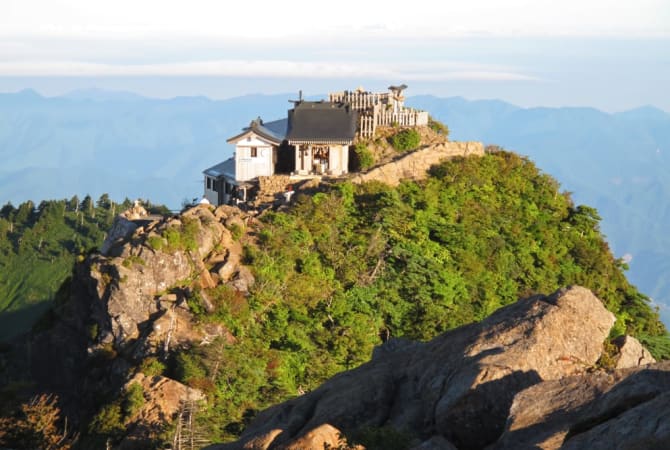
Travel Highlights
Popular places.
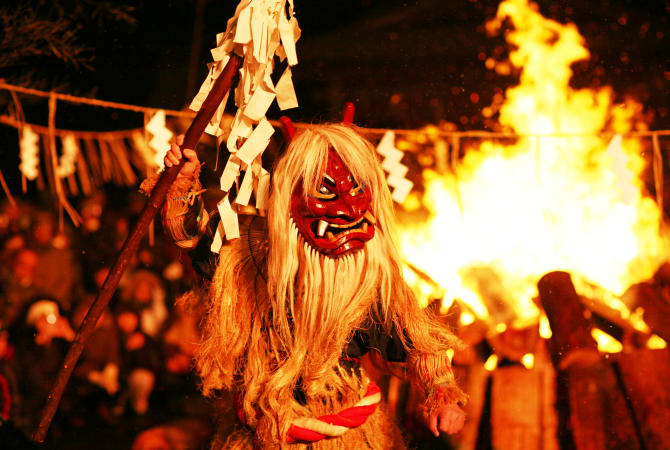
Explore by Interest
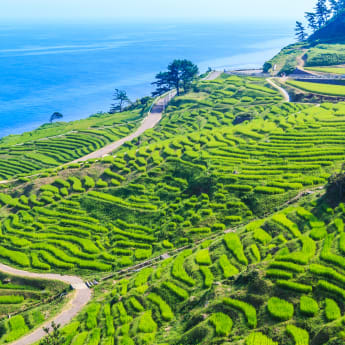
Important Notice
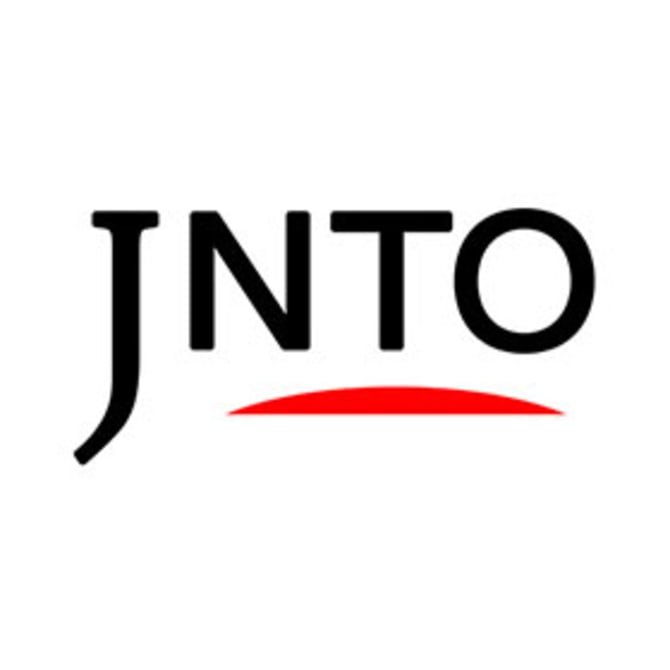
News from JNTO & Our Partners
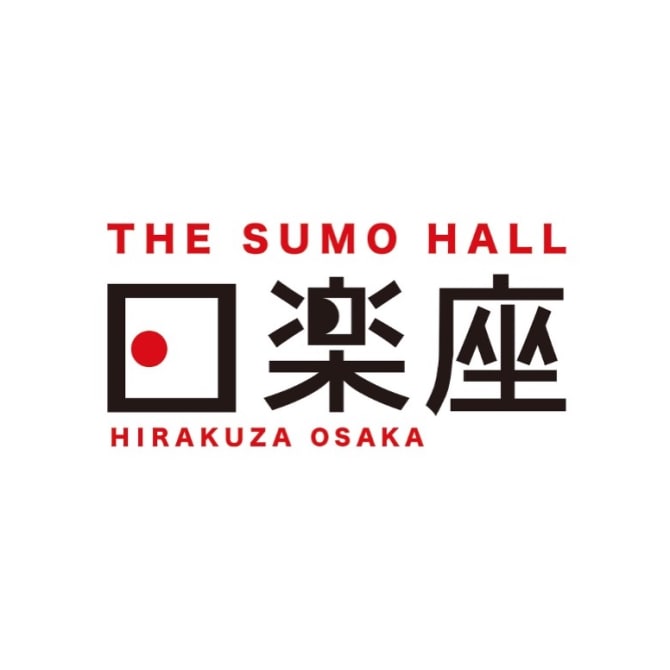
Inspiring Articles

Food features
For First-Time Visitors
- Wi-Fi & Connectivity
- Weather & Geography
- IC Travel Cards
Where to Stay
- Luxury Stay
- Haneda Airport
- Narita Airport
- Osaka (KIX)
- Fukuoka Airport
Getting Around
- Shinkansen (Bullet Train)
- Luggage & Storage
Suggested Walks & Tours
- Tokyo 48 Hours
- Golden Route
- 2 Weeks in Japan
- Tour & Activities
Brochure Download
- Tours and Activities

Japanese Government Information
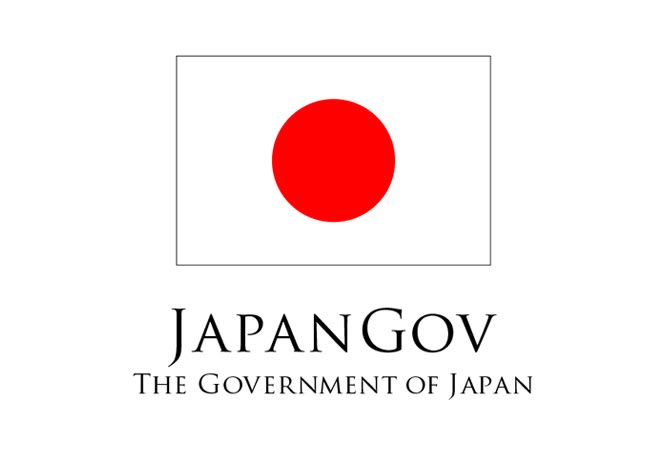
Please Choose Your Language
Browse the JNTO site in one of multiple languages
REQUEST INFORMATION
Don't know which tour is suitable for you.
Let us help you. Please tell us more about your interests. We will send some suggestions based on your needs.

- Trip Finder
- Saved Tours
- Our California office it's now
- 06:39 AM(Wed) - We Are Close
- Tel: 1-909-988-8885 Toll free : 1-855-325-2726 (USA & CANADA)

- Monday to Friday 8:30AM - 5:30PM (PST) Saturday 8:30AM - 3:00PM (PST)
TRAVEL | When to Go
WHEN IS THE BEST TIME TO VISIT JAPAN?
Article | |--> Dayna Hannah
Share to friends

WHEN IS THE BEST TIME TO VISIT JAPAN | BEST SEASON TO TRAVEL TO JAPAN
“When is the best time to go to Japan?” I get this question at least once a week. I used to answer with a bunch of information about my favorite festivals , food , seasonal flowers , and so on. But now, I counteract it with this question: “What interests you about Japanese culture?” No matter when or where you go , you’ll have more than enough options for things to see and do. Here, we’ve broken down the best things about Japan by season and month to help you start planning your trip!
SPRING IN JAPAN
Japan’s spring season lasts from mid-March to early May, depending on where you visit. Most parts experience fluctuating temperatures with chilly mornings and evenings and warm afternoons. Average temperatures in Tokyo range between 40°F to 79°F (4°C to 23°C). Check your destinations’ weather reports before you pack and bring multiple layers.

Things to Do in Japan in March

Plum Blossoms

AnimeJapan Convention

Fire and Light Festivals in Kansai
Things to do in japan in april.

Takayama Sanno Spring Festival

Wisteria Bloom
Things to do in japan in may.

Mount Fuji Shibazakura Festival

Kyoto Aoi Matsuri

Baby Blue Eyes Festival
Ibaraki Prefecture’s newest claim to fame is the Baby Blue Eyes flower display in Hitachi Seaside Park. From mid-April to early May, 4.5 million flowers bloom on Miharashi no Oka Hill. Around the same time, you can also see thousands of tulips and some late-blooming cherry blossom trees. Average Temperatures in Tokyo in May High: 23°C/73°F Low: 15°C/59°F Click Here for More About May
VIEW JAPAN SPRING TOURS FOR 2024, 2025 & 2026
Summer in japan.
There’s no getting around it. Many regions of Japan have subtropical climates, and they can get quite hot and humid. In Tokyo, the lowest average temperature in June is 66°F (19°C), and the highest in August is 88°F (31°C). That might not sound terrible to some, but take into account that the humidity level can reach 83%!

Things to Do in Japan in June

Yosakoi Soran Bushi in Sapporo

Hydrangea in Hakone
Things to do in japan in july.

Lavender Fields in Furano and Biei

Kyoto Gion Matsuri

Wear a Yukata
Things to do in japan in august.

Awa Odori Festival in Tokushima City

Attend Tohoku’s Three Great Festivals
Around the same time in August, three of Japan’s biggest festivals take place in the Tohoku region. Aomori City holds the Nebuta Festival , where teams pull massive paper floats through the streets. During the Kanto Festival in Akita, performers balance several-meter-high poles with dangling lanterns on different parts of their bodies. You can also celebrate Tanabata in Sendai , where paper decorations and streamers cover every inch of the downtown area. Average Temperatures in Tokyo in August High: 31°C/88°F Low: 24°C/75°F Click Here for More About August
VIEW JAPAN SUMMER TOURS FOR 2024, 2025 & 2026
Autumn in japan.
Depending on where you go, you’ll start to feel the autumn chill at some time between September and early December. The temperate weather and fall foliage brings in almost as many visitors as cherry blossoms but is a little less overwhelming. The leaves’ brilliant colors stay around for about a month, which helps stagger the influx of crowds. Pack long sleeves and plenty of layers if you intend on racing around Japan’s rural areas.

Things to Do in Japan in September

Kishiwada Danjiri Matsuri

Tokyo’s Sumo Tournament
Things to do in japan in october.

Takayama Hachiman Autumn Festival

Ride the Shimanami Kaido
Things to do in japan in november.

Meiji Jingu Gaien Ginkgo Festival

Shichi Go San
Though it isn’t an official holiday, it’s undoubtedly the cutest! In Japanese culture, seven, five, and three are lucky ages. Boys aged three and five and girls aged three and seven wear kimonos and receive blessings at shrines. This event takes place on the weekend closest to November 15th. Average Temperatures in Tokyo in November High: 17°C/63°F Low: 9°C/48°F Click Here for More About November
VIEW JAPAN AUTUMN TOURS FOR 2024, 2025 & 2026
Winter in japan.
If you’ve ever been traipsing about in Tokyo in midsummer , it might be hard to believe that it can get cold in Japan! Depending on how far north or south you are, winter in Japan is from December to mid-March with average temperatures swinging between 35°F and 53°F (2°C and 12°C) in Tokyo. Bring warm clothes no matter where you go, and consider packing snow boots if you’re headed north.

Things to Do in Japan in December

Winter Illuminations

Chichibu Yomatsuri

Celebrate the New Year
Things to do in japan in january.

Snow Monkeys at Yudanaka Onsen

Gassho Houses in Shirakawa-go and Gokayama
Things to do in japan in february.

Sapporo Snow Festival

Otaru Snow Light Path Festival

Kawazu Cherry Blossoms
Believe it or not, you can see cherry blossoms in winter! Kawazu is a small town near Tokyo where an unusual breed of sakura grows. These trees bloom earlier and at a slower rate than most cherry trees. The height of the festival usually happens around the last week of February and the first week of March. Average Temperatures in Tokyo in February High: 10°C/50°F Low: 2°C/35°F Click Here for More About February
VIEW JAPAN WINTER TOURS FOR 2024, 2025 & 2026
When is the worst time to go to japan.

Golden Week

Lunar New Year
For China and other Eastern countries, the period before, after, and during the Lunar New Year is a peak period for travel. The annual dates generally fall in January or February. Not everyone goes to Japan, but it is a desirable destination because of its proximity. You can join in the fun in Yokohama , Nagasaki, and Kobe’s Chinatowns. Got a good idea of when you want to go to Japan?
CLICK HERE TO BROWSE OUR GROUP TOURS FOR 2024, 2025 & 2026
Click here to make a customized private journey, blog categories.
Food & Drinks
Special Events
Subscribe for Blog
Don't know which tour is best for you let us help you..
- Request Information
- share trip finder saved tours inquiry book now

Email Signup

IMAGES
VIDEO
COMMENTS
Last updated: Wednesday, May 31st, 2023. Get ready for your dream trip to Japan! Japan is now open to travelers from all countries or regions! Those who enter Japan on or after April 29th 2023 are not be required to present a valid vaccination certificate or a Covid-19 negative test certificate.
If you need after-hours assistance in an emergency, please call 03-3224-5000 and ask to speak with the Embassy's duty officer. Emergency Contact Information for U.S. citizens. Emergency Preparedness for U.S. citizens in Japan. Sources of Help, including counseling services. Medical Assistance in Japan.
Visit Japan Web All coronavirus-related information on this website is gathered from the government ministries and authorities responsible for handling COVID-19 restrictions and measures. Due to the regularly changing situation and the constant updating of information, it is essential that you always check for updates and follow the latest ...
Widespread ongoing transmission of a respiratory illness caused by a novel (new) coronavirus (COVID-19) has been reported in Japan. Widespread ongoing transmission means that people have been infected with the virus, but how or where they became infected is not known, and virus transmission is ongoing in many communities across a country or region.
Since October 11th 2022, Japan has fully reopened its borders to tourists, allowing visa-free, independent travel to Japan once again 🙌. A visa is no longer required for short stays (up to 90 days). It's not necessary to book through a travel agency. Daily entry caps have been phased out entirely.
Aug 31, 2022. Prime Minister Fumio Kishida said Wednesday that Japan will allow the entry of nonescorted visitors on package tours and raise the daily arrival cap to 50,000 starting Sept. 7 — a ...
Now, the country appears to be returning to normal, in time for some to book travel for Japan's fall foliage. Kishida said a campaign aimed at bolstering the tourism industry would be rolled out ...
Last Update: December 4, 2023 (this page will be updated as needed) Japan is open! Visa-free, independent travel is now possible for most nationalities. ... You can use the Visit Japan Web app to upload your immigration and customs details in advance. See our Guide to the Visit Japan Web app and Japan Entry Procedures for all the details. Note ...
Last updated: Friday, June 9th, 2023. We welcome you to visit Japan. A dip in a secluded mountain hot spring, a stroll through a picture-perfect temple garden, a steaming bowl of ramen at a hole-in-the-wall noodle shop; get ready to make your Japan dreams a reality.
In order to visit Japan, travelers must book their flights and accommodation through a licensed travel agency. There are reports, however, that Japan could remove the daily cap of 50,000 arrivals by the end of the month and return to visa-free and independent travel. Japan's chief cabinet secretary, Hirokazu Matsuno, said the government is ...
9. Visit Japan Web. 10. Installation of apps and other requirements upon entry into Japan. All coronavirus-related information on this website is gathered from the government ministries and authorities responsible for handling COVID-19 restrictions and measures. Due to the regularly changing situation and the constant updating of information ...
After plenty of false starts, Japan is set to fully reopen its borders to tourism next month after more than two years of strict COVID-19 border restrictions. According to local media, the daily ...
If you're planning to travelto Japan, here's what you'll need to know and expect if you want to visit during the Covid-19 pandemic. The basics. It's official: Japanwill reopen to tourism ...
As one of the countries with the most stringent pandemic-related restrictions, Japan is finally opening up to mass tourism again. After more than two years, tourists will be allowed back from October 11. Most of the country's entry restrictions will be eased, including a daily passenger cap on visitor numbers.
Japan Travel Advisory. Japan - Level 1: Exercise Normal Precautions. Reissued after periodic review without changes. Exercise normal precautions in Japan. Read the country information page for additional information on travel to Japan. If you decide to travel to Japan: Enroll in the Smart Traveler Enrollment Program (STEP) to receive Alerts ...
Visit Japan Web can be used normally without setting. ... After editing, registration is made by clicking the "Update" button and Registration Completion Dialog is displayed. If you have registered family members traveling with you, a "Next" button will be displayed, so click "Next" to display the declaration details for family ...
new travel restrictions On November 29, 2021, the Government of Japan announced strengthened quarantine measures in response to the emergence of the Omicron variant of COVID-19. Effective November 30, 2021 at 00:00, entry of new, non-resident foreign nationals (to include students on educational travel) will be suspended.
Japan is now open to travelers from all countries or regions. Travelers are required to provide either a valid COVID-19 vaccination certificate (3 doses) of WHO-approved vaccines or a certificate of negative result of pre-departure COVID-19 test conducted within 72 hours prior to departing from the originating country/region.Visit the Fast Track website to facilitate smooth entry to Japan.
On Sept. 26, Japan's Ministry of Foreign Affairs, which governs entry requirements, officially announced that as of midnight local time on Oct. 11, "foreign nationals enter[ing] into Japan for a short-term stay for tourism will be no longer limited under package tours." On the same date, according to the website, a visa will no longer be required for visitors from 68 countries, including the ...
Outside the Noto Peninsula, tourism is much less affected. In Kanazawa, most tourist attractions reopened within four days of the quake. An exception was the 21st Century Museum of Contemporary Art, which suffered some damage, but reopened partially on February 6 and fully on June 22. Read our report from Kanazawa from early February.
For Travelers. Information in case of illness or injury. Official announcements from the Government of Japan. Answers to your questions about traveling to Japan and staying safe during COVID-19, including where to get help if you need it.
The official site of Japan National Tourism Organization is your ultimate Japan guide with tourist information for Tokyo, Kyoto, Osaka, Hiroshima, Hokkaido and other top Japan holiday destinations. We offer travel information to make your Japan travel more comfortable and enjoyable.
SPRING IN JAPAN. Japan's spring season lasts from mid-March to early May, depending on where you visit. Most parts experience fluctuating temperatures with chilly mornings and evenings and warm afternoons. Average temperatures in Tokyo range between 40°F to 79°F (4°C to 23°C).